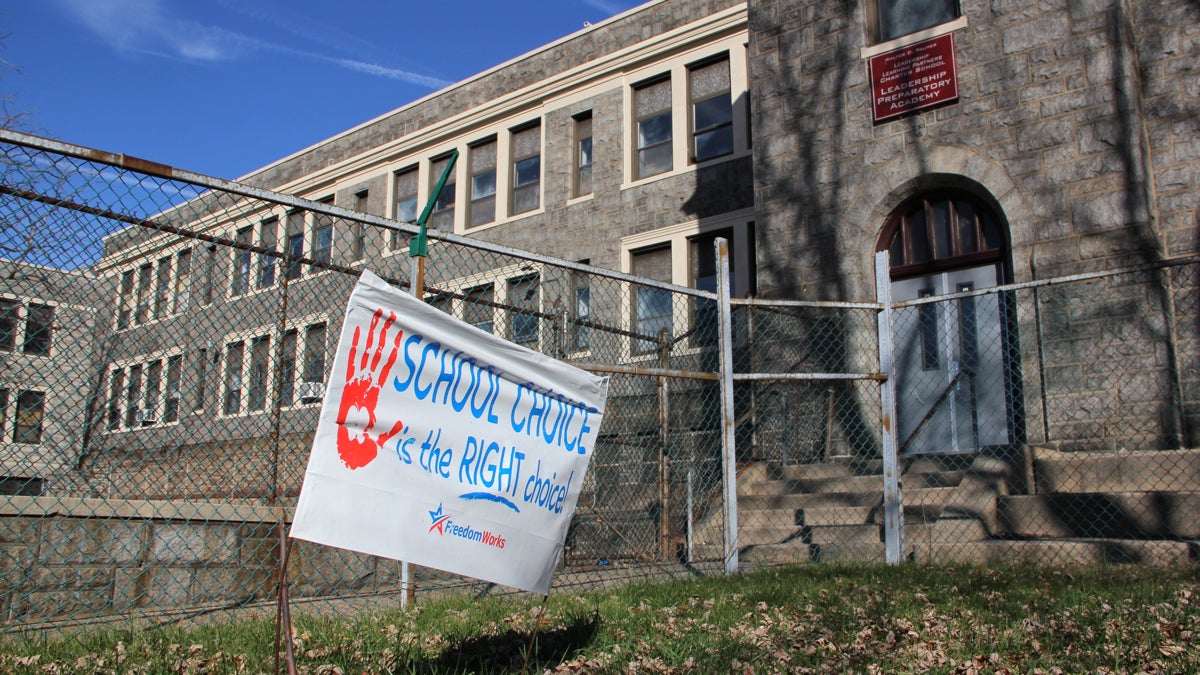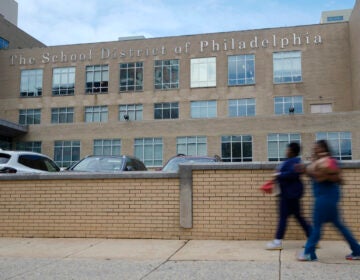Walter Palmer charter closes leaving hundreds of Philly students in the lurch
Listen
The troubled Walter D. Palmer Leadership Learning Partners Charter School has shut down completely. (Emma Lee/WHYY)
This year brought the Walter Palmer Leadership Learning Partners Charter School to the end of its rope.
In April, the Philadelphia School Reform Commission voted to revoke Palmers’ charter based on the schools’ subpar academic output and worrisome fiscal health.
In October, facing an insurmountable budget crunch, Palmer shuttered its 286-student high school campus in Wissinoming and held a lottery to whittle the enrollment of another 250 students at its elementary schools there and in Northern Liberties.
Last week, in a move that’s making some parents furious, Palmer’s school board voted to permanently close the financially embattled school on New Year’s Eve.
Parents were notified in a letter dated Dec. 26.
“The Board of Trustees spent countless hours trying to review options; however in the best interest of students and families that we serve, and the dedicated staff, the only option available is to close our school,” founder Walter Palmer wrote in the letter.
West Philadelphia parent Jihan Pauling called the entire ordeal a “major hardship.”
“I have lost sleep. I have had to take so much time off work…” said Pauling, parent of a second-grader. “It’s hard to reroute in the middle of the school year.”
“How do you explain to a 7-year-old that your school is closing? And what makes it so bad is that he already knew. He was on his third teacher,” she said. “The teachers were quitting left and right on us.”
Court rulings and student caps
In a telephone interview Monday, Palmer blamed the school’s downfall on what he called a “patently wrong” court ruling.
In May, the Pennsylvania Supreme Court overturned a series of lower court decisions, ruling that the charter must obey the terms of the contract it signed with the district in 2005 which capped enrollment at 675 students.
Palmer and the district sparred for a decade over this number. This year, Palmer said, his schools began with close to 1,300 students.
Palmer believes the 2005 signed charter lacked “mutual assent.”
“It was either sign it or you won’t have a school,” he said.
The Supreme Court also ordered Palmer to pay the district $1.5 million to make up for some of the students it enrolled above the cap. Beginning in January, the district informed Palmer that it would start deducting $250,000 per month from its payment to cover this debt.
Palmer called this the “crowning blow.”
The district also said Palmer needs to repay $1.1 million based on the charter charging the district for students who never actually attended the school.
Palmer denies the allegation.
The district also contends Palmer owes it more than $600,000 in backlogged teacher pension payments.
“The pensions kept growing, growing, growing,” said Palmer. “Of course, that’s been the major fight all across the country, trying to rein in this system. But we were financially sound.”
In September, Philadelphia Common Pleas Court joined the Supreme Court in rebuking Palmer’s position.
Telling Palmer it was irresponsible to continue enrolling more students than the school would be reimbursed for, Judge Nina Padilla-Wright ordered the school to reduce enrollment to within the signed cap.
In April, when the district recommended that Palmer close its doors at the end of last school year, Palmer dismissed the notion as an unnecessary fear tactic.
“I don’t think they should be looking for another school,” Palmer said of his students in an interview at the Northern Liberties campus at the time. “The reason this is done is to try to do that, to create fear, to create pandemonium.”
Some of the parents who stuck with Palmer felt betrayed when the school displaced close to 600 students in October.
“I trusted them,” cried grandparent Rashida Jabbar at a meeting in the school’s basement. “They’re just throwing him to the wolves.”
Palmer reaffirmed his position Monday.
“I don’t think it was a mistake at all. Parents, for the most part, are more intelligent than people give them credit for,” said Palmer. “They were fighting for school choice … These are fighters, many of these people.”
Palmer was one of a handful of Philadelphia charter schools investigated following the statewide standardized test-cheating scandal, which came to light based on highly improbable wrong-to-right erasures.
The investigation at Palmer was inconclusive.
New testing security measures put in place for 2012 brought a significant drop in scores. For 11th-graders, proficiency rates dropped by 38 points in reading and 46 points in math.
According to the state’s school performance profile index, Palmer charter ranks near the bottom of all Philadelphia public schools.
School Reform Commission Chairman Bill Green has said that 85 percent of Palmer’s students would be better off academically at their district-run neighborhood schools.
Palmer is the second charter to close its doors this year. Wakisha charter, which began 2014-15 with 250 students, closed on Dec. 19.
‘Really bad timing’
District officials said they learned of Palmer’s plans to close over the weekend.
“It’s unfortunate that it occurred during a period where schools are closed and parents are in the midst of getting ready for the holidays,” said district spokesman Fernando Gallard. “It’s really bad timing for parents and students.”
Parent Pauling said the district shares in the blame for her hardship, wishing there had been more communication and transparency.
“We had no one to rely on for any type of information. Somewhere along the line, somebody could foresee this happening,” she said.
The district sent letters to parents in October informing them of transfer options. Pauling went through that process, but the school the district referred her to – Overbrook Educational Center – turned her away.
“That day my son stayed home. He said, ‘Mom, no school wants me.’ He said, ‘What am I going to do? Where am I going to learn?'” she said.
Pauling doesn’t consider her neighborhood school, Heston Elementary, a viable option.
Told of Pauling’s predicament, Gallard offered an apology, saying, “We try to be as accurate as we can with our placements.”
Though her son has now received a placement in Bache-Martin, Pauling said she fears the transfer will again be botched.
To give parents a forum to air grievances against both Palmer and the district, Pauling is organizing an assembly at 5 p.m, Monday evening outside of Palmer’s Northern Liberties campus.
She says the group will file a letter with the Pennsylvania Department of Education asking for Palmer’s charter to be turned over to parents.
Pauling’s issues aside, the district said Palmer parents can enroll their children in its schools immediately through its web portal. It will also host a series of in-person enrollment sessions over the next week at its 440 N. Broad headquarters:
Wednesday, 10 a.m. to noonFriday, 10 a.m. to 3 p.m.Monday, 9 a.m. to 5 p.m.
In addition to their neighborhood school, which accepts students year-round, parents will be able to choose any other district school that has vacancies.
Gallard acknowledged the stress this could put on the district’s own under-resourced schools.
“To have students come in in the middle of the school year into your classroom as a teacher is very challenging,” he said. “But our teachers are very welcoming and prepared. We do have a lot of students moving within our school district unfortunately. So they are prepared for that.”
Most charter schools do not accept students midyear.
Neither Gallard nor Palmer could say exactly where the students displaced in October matriculated.
Despite the announced closing, the district will continue the charter revocation process.
For Pauling, this experience is the beginning of a crusade.
“I just want to fight for the whole practice to change,” she said. “I’m just very upset this can occur to children.”
WHYY is your source for fact-based, in-depth journalism and information. As a nonprofit organization, we rely on financial support from readers like you. Please give today.





